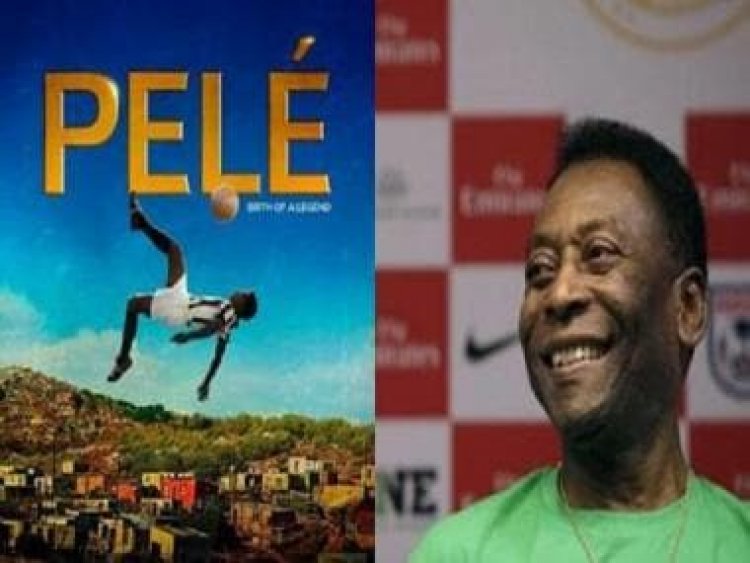Explained: Pelé in pop culture and how he fought the Nazis
Explained: Pelé in pop culture and how he fought the Nazis

After Pelé, widely acknowledged as the greatest footballer of all time, passed away last week, the tributes poured in from people around the world. A.R. Rahman, for example, was among the first Indian celebrities to tweet, sharing one of his own compositions from Pelé: Birth of a Legend, a 2016 biopic on the great man, a film where Rahman had composed the music. And while the film did feature the obligatory cameo from Pelé himself, this was far from the footballer’s first or indeed, his most famous outing at the movies.
That happened back in the 80s, with John Huston’s Escape to Victory (1981), a sports drama set during World War II. Huston had been responsible for some of the biggest Hollywood films during his peak, from the 40s to the 60s, including The Maltese Falcon, The Treasure of Sierra Madre and The Misfits. This was the twilight of his career but even so, he commanded a formidable star cast.
Sylvester Stallone and Michael Caine played Allied prisoners of war alongside Pelé, with Max von Sydow playing one of the Nazi major at the German camp they’re all hauled up in. The Allied prisoners end up playing a German team in an exhibition football match—in the film’s rousing climax, our protagonists use crowd confusion at the end of the match to escape. Team sports and nationalism have always gone hand-in-hand in popular culture. Think about the Mike Marqusee book War Minus the Shooting, about the 1996 cricket world cup in Asia. Or to use a more recent example, the Shahrukh Khan film Chak De India, not to mention Aamir Khan’s earlier Lagaan.
Of course, Pelé’s presence and his still-excellent skills on the field (he had been retired for 4-5 years at the time) took the football scenes in the film to a different level. Mind you, Escape to Victory featured quite a few professional footballers, including Bobbie Moore and John Wark. And even more impressively, he stood toe-to-toe with genuinely great actors like von Sydow and Caine during dramatic and wryly funny scenes alike. Before this film he had a string of cameo appearances in Brazilian films and TV shows down the years, but nothing remotely this substantial. But you would never guess this looking at the movie.
There are so many Pelé references across films and shows around the world that it’s difficult to pick just a few—he really was one of the world’s most instantly recognisable people in the 1970s, in particular. During the hilarious job interview scene from Hrishikesh Mukherjee’s classic comedy Gol Maal (1979), Utpal Dutt’s comically strict and forbidding Bhawani Shanker gets irritated at a candidate’s rhapsodic references to Pelé, including the racialised epithet “Black Pearl”.
The racialised bit is also the punch line of a Pelé reference in That 70s Show, when Red Forman (Kurtwood Smith) calls Fez (Wilmer Valderrama) by a variety of wrong names, all of them racial caricatures. There’s ‘Haji’, ‘Sabu’, ‘Aladdin’, and in this vein, one day Red calls him “Pelé”. A distraught Fez is then consoled by Red’s wife Kitty (Debra Jo Rupp) who remarks that Pelé is a “wonderful soccer player” (for American audiences, of course, ‘football’ communicating a different sport).
A few years after John Huston’s Escape to Victory, Pelé ended up playing himself in 1986’s Hotshot, directed by Rick King, who would go on to co-write the screenplay for Point Break, one of the most influential films of the 90s. The film saw Jim Youngs playing a young American footballer who travels to Brazil in search of the great man—the aim, as we discover through the course of the film, is spiritual guidance as much as football skills. Once again, audiences were appreciative of how natural Pelé felt on camera, although the film wasn’t really in the John Huston league, truth be told.
In one of the (admittedly, many) scenes from Escape to Victory that trade on Pelé’s celebrity, we see the Allied team’s coach, a well-meaning British gent, trying to warn them against overusing setpieces, lest they get too tired in the second half. A shirtless Pelé gets down from his bunk bed, takes the chalk from the coach, and says, “Pass me the ball and I do this and this, and this”—making zig-zag lines till he reached the opposite goal, to peals of laughter from his fellow soldiers.
The audience is in on the joke because that’s how immutable and unimpeachable his skills were. That’s what it meant to be Pelé, the greatest football player of all time and the man who stole the show from Sly Stallone and Michal Caine.
Read all the Latest News, Trending News and Entertainment News here. Follow us on Facebook, Twitter and Insta
What's Your Reaction?



























































